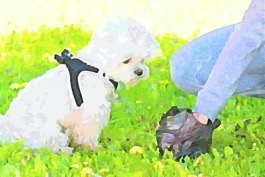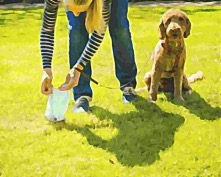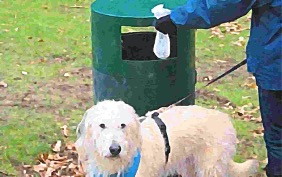I know how it feels – when you’re unsure how others might react as you mention ‘dog poop.’ In some places, people consider poop as “childish,” and even when you think of using “shit,” it can sound a bit too crude; even “waste” can sound somewhat “clinical”
So what’s the best alternative word to politely say “dog poop”?
One polite way to refer to “dog poop” is to use the term “dog fouling.” However, phrases like “what a dog has left behind,” “instances of unlucky steps,” and “doggy-do” are courteous ways to refer to ‘dog poop’ also.
The UK-based Royal Society for the Prevention of Cruelty to Animals (RSPCA) has a publication titled ‘Complete Dog Care Manual.’ In the manual, they headline a section with the phrase “Cleaning up dog mess.”
So, this gives an idea that ‘dog mess’ is more polite to use or “correct,” but it would surprise you to know how uncommon it is for people to use “mess”
In the rest of this article, you will find ten polite ways to say “dog poop” and the different scenarios where they best fit.
10 polite ways to say “dog poop”

Using a polite word instead of slang like “dog poop” shows respect for others and the environment.
It’s also more appropriate in formal or professional settings where casual language may be frowned upon.
Also, using these polite options can help to create a more positive and respectful tone in your conversations about potentially sensitive topics, such as pet waste management.
1. Dog dirt
Using the term “dog dirt” instead of “dog poop” may be considered more polite because it sounds less graphic and vulgar.
It also avoids potentially offending those who may find the term “poop” inappropriate or offensive.
You may consider using “dog dirt” in more formal settings such as professional environments, when addressing a senior person, or when speaking with people who are easily offended.
For example, in a public park, you could say:
- Please clean up after your dog and remove any dog dirt from the area ✅
- Please clean up after your dog and remove any dog poop from the area.❌
2. Dog business
Using “dog business” instead of “dog poop” is a more polite way to refer to dog waste, especially around those who might be uncomfortable with more direct language.
Whenever I take a walk to the park or playground, I prefer to use the term “dog business,” especially if h n warning others about the presence of dog waste. I believe it’s more considerate.
For example:
- Watch out for the dog business on the path ✅
- Watch out for the dog poop on the path.❌
Also, if you find yourself in a professional setting such as a veterinarian’s office or a dog training facility, it’d be more appropriate to use the term “dog business” when discussing topics related to dog waste.
It will show that you are respectful and professional.
3. Doggie deposits
Another polite way to say “dog poop” is to say “Doggie deposits.” The latter is considered a more polite term because it sounds less crude and vulgar.
However, using this particular term will only be more appropriate in certain situations, for instance around those who might be sensitive or uncomfortable with more direct language.
For example:
- When discussing dog waste with someone who is easily offended or disgusted, it may be more respectful to use the term “doggie deposits” rather than “dog poop”.
This shows that you are aware of their sensitivity and are making an effort to use courteous language.

4. Renegade dog leavings
“Renegade dog leavings” may be a better term to use in professional settings such as dog groomers or pet stores.
It is also a better alternative when writing a blog or article especially when steering away from SEO penalties over the use of vulgar words.
A lot of online media publications resort to “renegade dog leavings” than any other term for dog waste.
Using this more polite term shows that you are professional and respectful towards both the dogs and their owners.
5. Dog waste
If you’re new to a community and unsure how they perceive the usage of certain words, it can be hard to figure this out.
When talking with someone who is easily offended or disgusted, it may be more respectful to use the term “dog waste” rather than “dog poop”.
However, in certain situations, even “dog waste” may not be the most polite term.
I remember when I was discussing dog waste in a formal or professional setting, after using “dog waste” and seeing the reaction of half the audience, I had to switch to using more technical terms such as “feces” or “excrement”.
The bottom line is that using “dog waste” instead of “dog poop” can be a more courteous and appropriate choice, but it ultimately depends on the situation and the people involved.
6. What a dog has left behind
I particularly like this phrase as my favorite and go-to word when trying to refer to dog waste, especially is a public environment where it can be misinterpreted.
The phrase “What a dog has left behind” is considered more polite than “dog poop” because it is a more indirect way of referring to dog waste.
It’s appropriate to use this replacement phrase in situations where people may consider direct language too vulgar or crude.
For example, when writing an essay or news story, you could use:
- The lady was asked to clean up what her dog had left behind. ✅
- The lady was asked to clean up dog poop ❌
As mentioned earlier, when you use this phrase, it shows that you are being considerate of your reader or listener sensitivities.
7. Instances of unlucky steps
Using the phrase “Instances of unlucky steps” as a replacement for “dog waste” can be seen as more polite because it avoids using a potentially offensive or vulgar term.
You can use this replacement in situations where you want to convey the same idea without causing offense or discomfort to those around you.
I spontaneously use this phrase when I’m trying to warn someone of dog waste on the sidewalk or something.
But here’s a perfect example:
- Take care of any instances of unlucky steps left behind by your pet ✅
- Pick up your dog poop ❌
8. Doggy-do
“Doggy-do” is a euphemism or a more polite way of referring to the feces or poop of a dog.
Look at it; it’s a more socially acceptable term to use in public, especially around children or in polite company.
Using the term “doggy-do” can help avoid offending or embarrassing others who may be uncomfortable with more direct or crude language.
You can use “doggy-do” as a replacement for “dog poop” in any instance where you want to refer to the feces of a dog in a more polite manner.
For example:
- Be careful not to step in any doggy-do on the sidewalk ✅
- Watch out for that dog poop on the sidewalk. ❌
9. Dog fouling
Have you noticed that corporate/government documents, newspapers, etc., tend to avoid directly referring to the excrement itself?
If you are in an environment where even the pronunciation of excrement or waste would alter the activity (for example, dinner) then you can use metaphorical expressions like dog fouling
For example, while having dinner, you can say
- There’s a problem with dog fouling in our local park ✅
- There’s a problem with dog poop in our local park ❌
10. Dog droppings
Alternatively, you can use the term “dog droppings”
But the right application for the word “droppings” for excrement is when you’re referring to birds.
So, you might still not want to use this if you aren’t referring to dog birds.
Still, “dog droppings” is a more clinical and formal term that is commonly used in official signage or in public announcements.
It is also considered a more neutral term that does not have any negative connotations or vulgar associations. So it’s a better polite alternative to “dog poop.”
When you use the term “dog droppings”, you reduce the risk of offending or embarrassing others, particularly in public or formal settings.
For example, a signpost on a residential street can read
- Please clean up after your dog’s droppings ✅
- Please clean up after your dog’s poop ❌

Final thoughts
By consciously choosing our words carefully, we can help foster a culture of kindness and respect for both people and pets alike.
As mentioned earlier, the word “shit” is widely considered vulgar. And don’t use “dogs”; use just “dog.”
You can say “dog excrement,” “dog dung,” or “dog feces.” I often use “dog droppings,”: but I eventually learned that “droppings” is usually used for birds, so you might not want to say that.
The most important thing is choosing the word your audience will understand and appreciate. But using any of the above alternative phrases will show consideration for those around you.
I’ve used the term “Dog rocks”.
Good one!